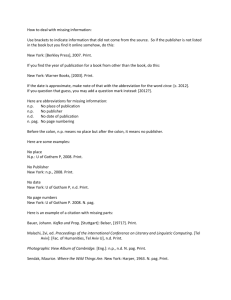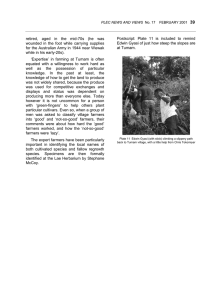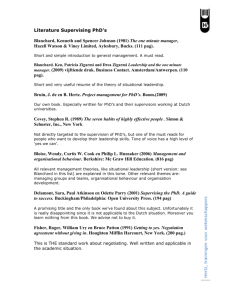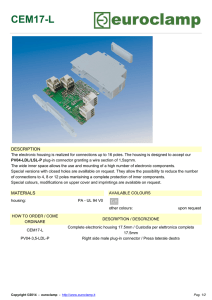Supporting farmers through a producers’ association in Honduras Case Studies - Livelihoods
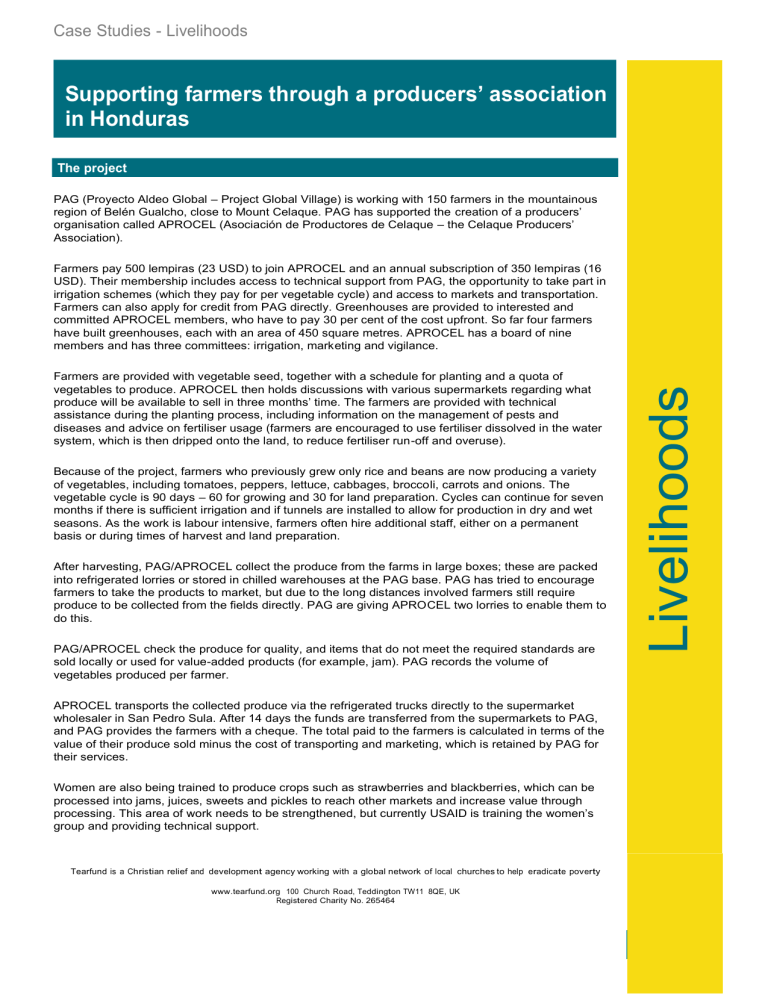
Case Studies - Livelihoods
Supporting farmers through a producers’ association in Honduras
The project
PAG (Proyecto Aldeo Global – Project Global Village) is working with 150 farmers in the mountainous region of Belén Gualcho, close to Mount Celaque. PAG has supported the creation of a producers’ organisation called APROCEL (Asociación de Productores de Celaque – the Celaque Producers’
Association).
Farmers pay 500 lempiras (23 USD) to join APROCEL and an annual subscription of 350 lempiras (16
USD). Their membership includes access to technical support from PAG, the opportunity to take part in irrigation schemes (which they pay for per vegetable cycle) and access to markets and transportation.
Farmers can also apply for credit from PAG directly. Greenhouses are provided to interested and committed APROCEL members, who have to pay 30 per cent of the cost upfront. So far four farmers have built greenhouses, each with an area of 450 square metres. APROCEL has a board of nine members and has three committees: irrigation, marketing and vigilance.
Farmers are provided with vegetable seed, together with a schedule for planting and a quota of vegetables to produce. APROCEL then holds discussions with various supermarkets regarding what produce will be available to sell in three months’ time. The farmers are provided with technical assistance during the planting process, including information on the management of pests and diseases and advice on fertiliser usage (farmers are encouraged to use fertiliser dissolved in the water system, which is then dripped onto the land, to reduce fertiliser run-off and overuse).
Because of the project, farmers who previously grew only rice and beans are now producing a variety of vegetables, including tomatoes, peppers, lettuce, cabbages, broccoli, carrots and onions. The vegetable cycle is 90 days – 60 for growing and 30 for land preparation. Cycles can continue for seven months if there is sufficient irrigation and if tunnels are installed to allow for production in dry and wet seasons. As the work is labour intensive, farmers often hire additional staff, either on a permanent basis or during times of harvest and land preparation.
After harvesting, PAG/APROCEL collect the produce from the farms in large boxes; these are packed into refrigerated lorries or stored in chilled warehouses at the PAG base. PAG has tried to encourage farmers to take the products to market, but due to the long distances involved farmers still require produce to be collected from the fields directly. PAG are giving APROCEL two lorries to enable them to do this.
PAG/APROCEL check the produce for quality, and items that do not meet the required standards are sold locally or used for value-added products (for example, jam). PAG records the volume of vegetables produced per farmer.
APROCEL transports the collected produce via the refrigerated trucks directly to the supermarket wholesaler in San Pedro Sula. After 14 days the funds are transferred from the supermarkets to PAG, and PAG provides the farmers with a cheque. The total paid to the farmers is calculated in terms of the value of their produce sold minus the cost of transporting and marketing, which is retained by PAG for their services.
Women are also being trained to produce crops such as strawberries and blackberri es, which can be processed into jams, juices, sweets and pickles to reach other markets and increase value through processing. This area of work needs to be strengthened, but currently USAID is training the women’s group and providing technical support.
Tearfund is a Christian relief and development agency working with a global network of local churches to help eradicate poverty www.tearfund.org 100 Church Road, Teddington TW11 8QE, UK
Registered Charity No. 265464
Case Studies - Livelihoods
Successes
Anecdotally, community members say that through the project ‘everything has changed’: farmers have moved from subsistence farming to producing surplus, and have more resources and income.
PAG has also implemented a health project, which has met with high approval from the community members. The initiative allows people to purchase simple medicines in their own communities under the guidance of a trained volunteer. Complicated cases are referred to the local health centre.
Challenges
PAG is experiencing some problems with farmers being unable to produce their quota and challenges of quality. Some farmers are sideselling the crops: if they need money faster than PAG’s process can supply it, they may sell produce for a lower price locally. Price stability depends on the season.
At present PAG are providing substantial support to APROCEL, but future plans include capacity building of APROCEL to market products on its own, now that it has received legal status. APROCEL wishes to include more farmers in the group and to increase the volume of sales.
W
The key for this project is the secure and defined market for which farmers produce their crops.
However, there are difficulties in accessing this market, with challenges in terms of transportation from the farm to collecting centres and onwards to San Pedro Sula.
Tearfund is a Christian relief and development agency working with a global network of local churches to help eradicate poverty www.tearfund.org 100 Church Road, Teddington TW11 8QE, UK
Registered Charity No. 265464
